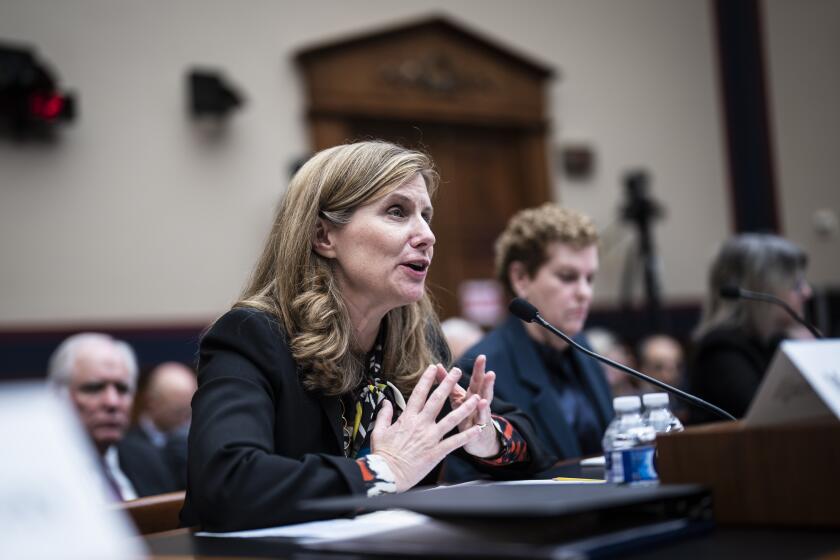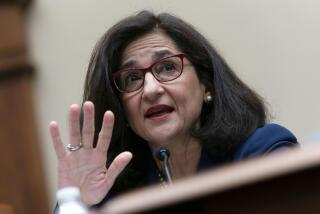Harvard president will stay on the job despite backlash over her congressional testimony

- Share via
CAMBRIDGE, Mass. — Harvard President Claudine Gay will remain leader of the Ivy League institution despite a backlash over her comments last week at a congressional hearing on antisemitism, the university’s highest governing body announced Tuesday.
“Our extensive deliberations affirm our confidence that President Gay is the right leader to help our community heal and to address the very serious societal issues we are facing,” the Harvard Corporation said in a statement following its meeting Monday night.
Only months into her leadership, Gay came under intense scrutiny following the hearing in which she and two of her peers struggled to answer questions about campus antisemitism. Their academic responses provoked a backlash from Republican opponents, as well as from alumni and donors who say the university leaders are failing to stand up for Jewish students on their campuses.
At issue was a line of questioning that asked whether calling for the genocide of Jews would violate the universities’ code of conduct. At the hearing, Gay said it depended on the context, adding that when “speech crosses into conduct, that violates our policies.”
Some lawmakers and donors to Harvard called for Gay to step down, following the resignation of Liz Magill as president of the University of Pennsylvania on Saturday.
The Harvard Crimson student newspaper first reported Tuesday that Gay, who became Harvard’s first Black president in July, would remain in office with the support of the Harvard Corporation. It cited an unnamed source familiar with the decision.
Leaders at University of Pennsylvania, Harvard and MIT failed to show moral clarity and good sense with evasive answers regarding calls for the genocide of Jews.
A petition signed by more than 600 faculty members asked the school’s governing body to keep Gay in charge.
“So many people have suffered tremendous damage and pain because of Hamas’ brutal terrorist attack, and the university’s initial statement should have been an immediate, direct, and unequivocal condemnation,” the corporation’s statement said. “Calls for genocide are despicable and contrary to fundamental human values. President Gay has apologized for how she handled her congressional testimony and has committed to redoubling the university’s fight against antisemitism.”
In an interview with the Crimson last week, Gay said she got caught up in a heated exchange at the House committee hearing and failed to properly denounce threats of violence against Jewish students.
“What I should have had the presence of mind to do in that moment was return to my guiding truth, which is that calls for violence against our Jewish community — threats to our Jewish students — have no place at Harvard, and will never go unchallenged,” Gay said.
The Palestinian cause — and hostility toward Israel — has shifted from the sidelines of student activism to a robust political movement at U.S. colleges.
Testimony from Gay and Magill drew intense national scrutiny and some anger, as did similar responses from the president of MIT, who testified alongside them before the Republican-led House Education and Workforce Committee.
Rep. Elise Stefanik (R-N.Y.), a committee member who repeatedly asked the university presidents whether “calling for the genocide of Jews” would violate the schools’ rules, voiced her displeasure on X, the social media platform, about the decision to keep Gay on the job.
“There have been absolutely no updates to [Harvard’s] code of conduct to condemn the calls for genocide of Jews and protect Jewish students on campus,” said Stefanik, who attended Harvard. “The only update to Harvard’s code of conduct is to allow plagiarists as president.”
The corporation also addressed allegations of plagiarism against Gay, saying that Harvard became aware of them in late October regarding three articles she had written. It initiated an independent review at Gay’s request.
The corporation reviewed the results of the review Saturday, “which revealed a few instances of inadequate citation” but found no violation of Harvard’s standards for research, it said. Gay is requesting four corrections in two articles to insert citations and quotation marks that were omitted from the original publications, the statement said.












